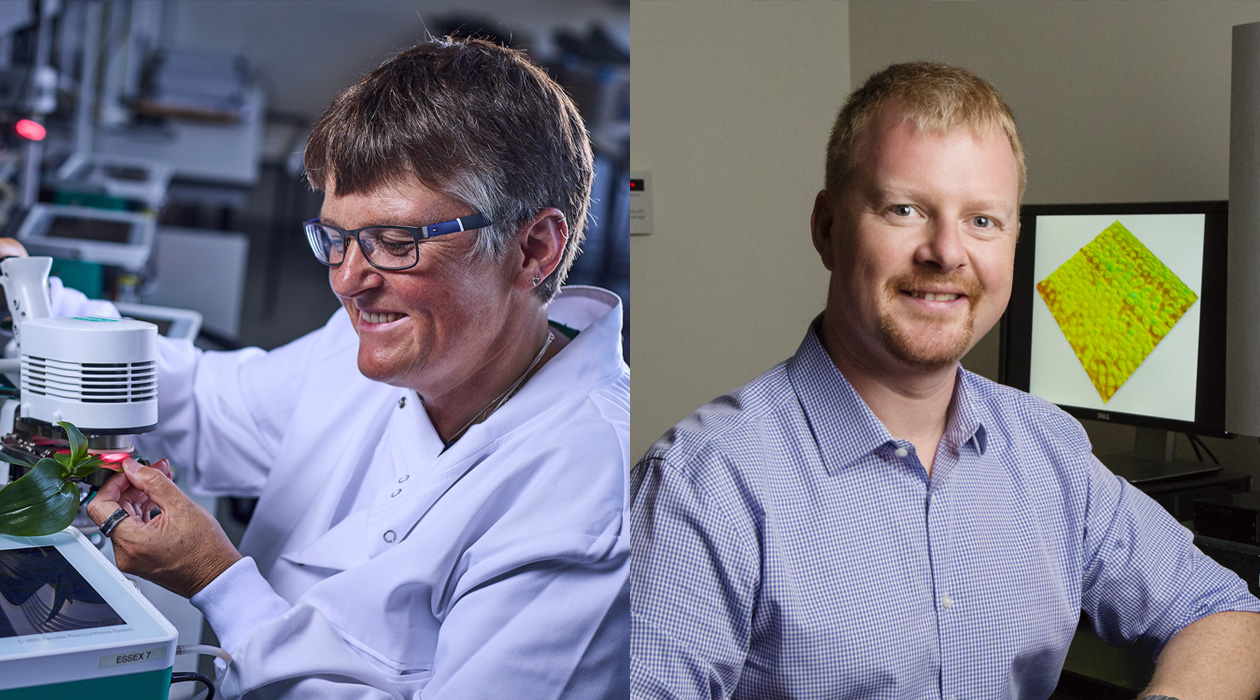NSF, international partners to invest nearly $10M in ASAP Global Center

Professor of Plant Biology and ASAP Director Tracy Lawson, left, with Professor of Plant Biology and ASAP Deputy Director Andrew Leakey. / L. Brian Stauffer, University of Essex
The U.S. National Science Foundation and partner agencies in the U.S., Canada, Finland, Japan, the Republic of Korea (ROK), and the United Kingdom announced funding of new international centers of excellence in their Global Centers competition.
One of the centers, the Alliance for Socially-acceptable & Actionable Plants, is led by the University of Illinois Urbana-Champaign and will feature international partners supported by the Research Council of Finland (RCF); the Japan Science and Technology Agency (JST); and United Kingdom Research and Innovation (UKRI).
“Faster progress towards a sustainable bioeconomy is essential to reduce carbon emissions and ensure the production of cleaner energy. One key goal is improving feedstock-crop performance and resilience. We are excited to be working with partners from around the world to tackle this important challenge, including understanding the social elements of technology acceptance,” said Tracy Lawson, a professor of plant biology and the Director of ASAP.
2024 Global Centers awards focus on advancing bioeconomy research to solve global challenges, whether by increasing crop resilience, converting plant matter or other biomass into fuel, or paving the way for biofoundries to scale-up applications of biotechnology for societal benefit. The program supports holistic, multidisciplinary projects that bring together international teams and scientific disciplines, including education and social sciences, necessary to achieve use-inspired outcomes. All Global Centers will integrate public engagement and workforce development, paying close attention to impacts on communities.
"Global Centers are leveraging expertise and resources across like-minded nations and uniting multidisciplinary teams from around the world to accelerate innovations in the bioeconomy for great impact," said NSF Director Sethuraman Panchanathan. "Together, we are forging new solutions to pressing socioeconomic challenges impacting all of us. These international centers of research excellence will generate crucial knowledge, empower communities and strengthen the foundations of global cooperation."
The ASAP Global Center at Illinois is led by Lawson and Andrew Leakey (CABBI leader/GEGC), a professor of plant biology and the Deputy Director of ASAP. The other project investigators at Illinois and partner institutes in Finland, Japan, and the U.K. include George Chryssochoidis, a professor of marketing and consumer behavior at University of Essex; Matthew Hudson (BSD/CABBI/GNDP), a professor of crop sciences at Illinois; Steven Kelly, a professor of plant sciences at Oxford University; Hyerhim Kim, an assistant professor of marketing at University of Essex; Leena Kunttu, a senior specialist of innovation development at University of Vaasa; Tommi Lehtonen, a director of responsibility and ethics at University of Vaasa; Diwakar Shukla (MMG), an associate professor of chemical and biomolecular engineering at Illinois; and John Shanklin (CABBI), a Senior Biochemist at Stony Brook University; Atsushi Takemiya, an associate professor of biology at Yamaguchi University; and Huimin Zhao (BSD leader/CABBI/CGD/MMG), a professor of chemical and biomolecular engineering at Illinois.
ASAP delivers synthetic biology solutions to produce high-energy, water use efficient crops. To do so, it exploits natural biodiversity in gene sequences to engineer crops with increased lipid content and greater water use efficiency. The Global Center draws on the expertise of a multi-disciplinary team of scientists from four countries to integrate recent breakthroughs in genetics, protein modelling, synthetic biology, AI, and biotechnology. ASAP also investigates attitudes among stakeholder groups toward biotechnology to achieve sustainability goals. The project directly leverages natural biodiversity across the tree of life. It employs a biofoundry and artificial intelligence tools to accelerate the crop improvement cycle. It trains the next generation of scientist expert in this field. Public and industry engagement strengthen its technological enterprise, accounting for consumer attitudes and market preferences.
“Progress towards improving feedstock crops for a viable bioeconomy is limited by the slow speed of the design-build-test-learn cycle and the urgent need to discover genetic variants that confer trait improvements,” Leakey said. “ASAP will deliver a synthetic biology solution to produce high-energy, water use efficient crops as a case study for leveraging robotics, AI-enabled analysis and gene editing in an integrated manner.”
